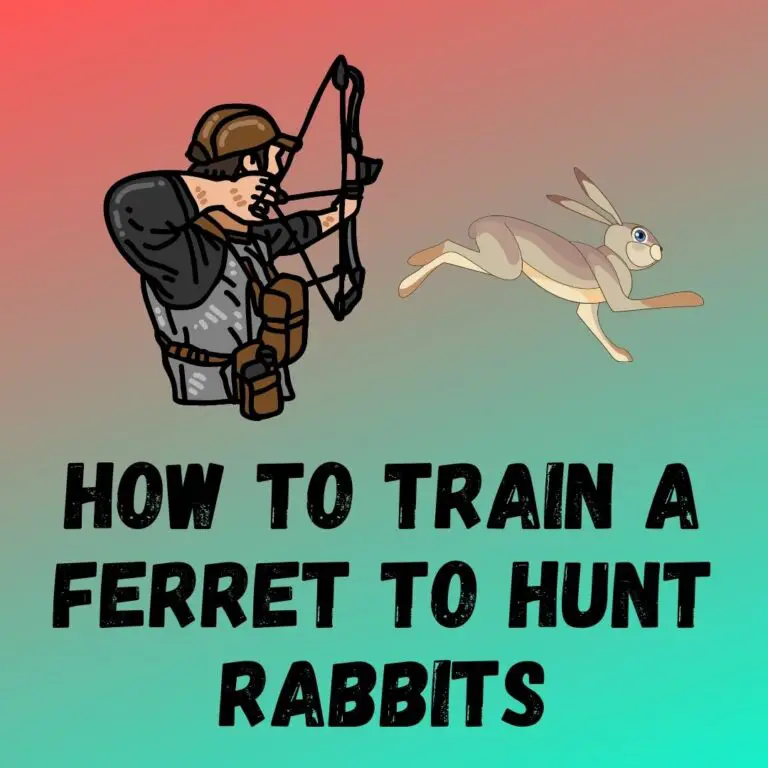
Are you ready to embark on a thrilling and unique hunting adventure? Look no further than hunting with ferrets. As an experienced hunter, I can confidently say that hunting with these incredible creatures is an exhilarating and effective way to track down small game. In this article, I’ll share my insights and tips on how to make the most of this ancient hunting technique. So, grab your gear and let’s dive into the fascinating world of hunting with ferrets.
When it comes to hunting, ferrets are nature’s stealthy allies. With their agile bodies and sharp instincts, these small mammals are perfectly suited for the task at hand. Whether you’re after rabbits, squirrels, or other elusive prey, ferrets can help you navigate the intricate underground tunnels and flush out your target. Join me as I delve into the intricacies of ferret hunting, from training and equipment to techniques and strategies that will give you the upper hand in the field.
So, if you’re looking for a way to enhance your hunting skills and experience the thrill of the chase like never before, hunting with ferrets is an adventure worth exploring. In the following sections, I’ll guide you through the essentials of this age-old practice, ensuring you’re well-equipped and knowledgeable to embark on your own ferret-assisted hunting journey. Let’s dive into this captivating world and discover the wonders of hunting with ferrets.
Key Takeaways
- Hunting with ferrets offers unique benefits such as stealth, versatility, increased success rate, conservation of game, and physical/mental stimulation.
- When choosing a ferret for hunting, consider factors such as size, temperament, gender, health/fitness, age, and previous hunting experience.
- Training your ferret for hunting should start early, include basic obedience training, introduce the hunting environment gradually, teach tracking skills and retrieval, and use positive reinforcement.
- Essential equipment for ferret-assisted hunting includes tracking collars, leads/harnesses, bags/carriers, ferreting nets, locators, and gloves.
- Effective hunting techniques and strategies include ferret-netting, teamwork with dogs, observing ferret behavior, mapping and observation of the hunting area, and practicing patience and persistence.
The Benefits of Hunting with Ferrets
When it comes to hunting, there are various techniques and methods to choose from. One lesser-known but highly effective method is hunting with ferrets. Having been an avid hunter for many years, I can confidently say that hunting with ferrets offers a unique set of benefits that can greatly enhance your hunting experience. Here are a few reasons why you should consider giving it a try:
1. Stealth and Agility: Ferrets are nature’s stealthy allies, renowned for their ability to sneak up on prey with ease. Their slender bodies and sharp senses make them excellent hunters. When hunting with ferrets, their agility allows them to navigate through dense underbrush and burrows, giving them an advantage in catching small game such as rabbits and squirrels.
2. Versatility: Unlike hunting with dogs, which typically specialize in certain types of game, ferrets are versatile hunters. They can be trained to track down a wide range of small game species, making them ideal companions for hunting enthusiasts who enjoy pursuing different types of prey.
3. Increased Success Rate: Hunting with ferrets can significantly increase your success rate. Their ability to flush out game from their burrows or hiding places greatly improves your chances of a successful hunt. Their natural hunting instincts, combined with proper training, allow them to work in sync with you to locate and catch elusive prey.
4. Conservation of Game: When hunting with ferrets, the goal is to flush out the game without causing harm. This technique allows you to assess and select the game you wish to pursue, ensuring sustainable hunting practices. By using ferrets, you can help preserve the population of the game species you target by only taking the appropriate number.
5. Physical and Mental Stimulation: Hunting with ferrets offers not only a thrilling and adrenaline-pumping experience but also physical and mental stimulation. As you work in tandem with your ferret, you need to be on high alert, honing your observation and strategic planning skills. Additionally, the physical activity involved in tracking and chasing small game provides an excellent workout for both you and your ferret.
Choosing the Right Ferret for Hunting
When it comes to hunting with ferrets, choosing the right ferret is crucial for a successful and enjoyable hunting experience. Here are a few key factors to consider when selecting a ferret for hunting:
- Size: Look for a ferret that is neither too large nor too small. A medium-sized ferret tends to be the most versatile for hunting purposes. They are agile enough to navigate small burrows and dense undergrowth, yet large enough to handle larger prey like rabbits.
- Temperament: A good hunting ferret should have an energetic and curious temperament. They should be naturally inclined to explore, seek out prey, and show an interest in hunting. Look for ferrets that display these traits during playtime or social interactions.
- Gender: Both male and female ferrets can make great hunting companions. However, it’s important to note that female ferrets, or jills, tend to be more bold and aggressive hunters. They can be more relentless in pursuing prey, making them desirable for certain hunting pursuits.
- Health and Fitness: Opt for a ferret that is healthy and in good physical condition. A healthy ferret is more likely to have the stamina, agility, and endurance needed for hunting. Ensure that the ferret has a shiny coat, bright eyes, and is alert and lively.
- Age and Experience: Consider the age and previous hunting experience of the ferret. While younger ferrets are generally more enthusiastic hunters, older ferrets with some hunting experience can also be valuable companions.
Remember, each ferret is unique, and it’s important to spend time interacting with prospective hunting ferrets to assess their suitability. Take note of their reactions, playfulness, and readiness to explore. Ultimately, choose a ferret that you connect with and believe will be a reliable and skilled hunting partner. With the right ferret by your side, you’ll be ready to embark on thrilling hunting adventures together.
Training Your Ferret for Hunting
Training your ferret for hunting is an essential step in maximizing its potential as a hunting companion. Here are some tips to help you train your ferret effectively:
- Start Early: It’s best to start training your ferret while it’s still young. Younger ferrets are more receptive to learning and are generally easier to train. Ideally, begin training when your ferret is around 10 to 12 weeks old.
- Basic Obedience Training: Before you can teach your ferret hunting-specific commands, it’s crucial to establish basic obedience training. Teach your ferret commands like “sit,” “stay,” and “come.” This will create a foundation of discipline and control that will be beneficial during hunting sessions.
- Introduce the Hunting Environment: Gradually introduce your ferret to the hunting environment. Start with short sessions in a controlled area, such as a backyard or a small enclosed space. This will help your ferret become familiar with its surroundings and build confidence.
- Teach Tracking Skills: Ferrets have a natural instinct for tracking scent. Use this to your advantage by teaching your ferret how to follow scent trails. Start by hiding treats or toys around the hunting area and encourage your ferret to find them using its sense of smell. Gradually increase the difficulty by making the trails longer or adding distractions.
- Practice Retrieval: Retrieval is an important skill for hunting with ferrets. Train your ferret to retrieve small game by using toys or dummies. Start by rewarding your ferret whenever it picks up the object and gradually progress to retrieving items over longer distances.
- Positive Reinforcement: Use positive reinforcement techniques such as treats and praise to reward your ferret for good behavior and successful hunting attempts. This will motivate your ferret to continue learning and performing well during hunting sessions.
Remember, training your ferret for hunting takes time, patience, and consistency. Be sure to reward your ferret for its efforts and always end training sessions on a positive note. With proper training, your ferret will become a skilled and reliable hunting partner. So get started and enjoy the thrill of hunting with your ferret by your side!
The Essential Equipment for Ferret-Assisted Hunting
When it comes to hunting with ferrets, having the right equipment is essential to ensure a successful and enjoyable experience. Here are some of the key tools and gear that I recommend for ferret-assisted hunting:
1. Ferret Tracking Collars: Tracking collars are a must-have for hunting with ferrets. These collars allow you to keep tabs on your ferrets as they venture into the undergrowth, helping you locate and retrieve them quickly. Look for collars that are durable, waterproof, and have a reliable range.
2. Leads and Harnesses: While ferrets are agile and nimble creatures, it’s important to have leads and harnesses to keep them under control during the hunting expedition. Opt for lightweight and adjustable leads that allow your ferret to move comfortably while still keeping them within reach.
3. Bags or Carriers: Carrying a bag or carrier is a practical way to transport your ferrets to and from the hunting site. Look for well-ventilated and secure options that provide a comfortable space for your ferrets to rest while you move around.
4. Ferreting Nets: Ferreting nets are used to block off escape routes and prevent small game from fleeing. These nets are lightweight and easy to set up, making them a valuable tool for trapping game in the hunting area.
5. Locators: Locators are electronic devices that emit a signal to help you locate your ferrets underground. These devices are particularly useful when hunting in burrows, as they allow you to pinpoint the exact location of your ferret, ensuring a swift and successful retrieval.
6. Gloves: Hunting with ferrets can be a hands-on activity, so it’s essential to protect your hands with durable gloves. Choose gloves that are thick enough to shield you from scratches and bites, while still allowing you to maintain a good grip on your ferret and other equipment.
By having these essential pieces of equipment, you’ll be well-prepared for a productive and rewarding hunting experience with your ferrets. Remember to choose quality gear that is suited to the specific needs of ferret-assisted hunting, ensuring the safety and comfort of both you and your ferrets.
Now that we’ve covered the essentials, let’s move on to discussing some effective hunting techniques to maximize your success in the next section.
Techniques and Strategies for Hunting with Ferrets
When it comes to hunting with ferrets, there are several techniques and strategies that can help maximize your success. As an experienced hunter, I have learned a few tricks of the trade that I’m excited to share with you. Here are some key techniques and strategies to consider when hunting with ferrets:
1. Ferret-Netting Technique: One effective technique is using ferret nets. These nets are strategically placed around potential escape routes of the quarry. By releasing the ferret into the burrow, it flushes out the game, causing them to run straight into the nets. This technique requires careful placement of the nets and a good understanding of the quarry’s behavior.
2. Teamwork with Dogs: Another strategy is to work in tandem with well-trained dogs. While ferrets are excellent at locating and flushing out small game, dogs can help with the retrieval process. They can track down the quarry once it has made its escape from the ferret’s chase. The combination of ferrets and dogs can be a powerful hunting duo.
3. Observing Ferret Behavior: Understanding your ferret’s behavior is crucial in hunting success. Pay attention to their body language and movements. When a ferret pursues a rabbit or another small game, they exhibit distinctive behaviors such as chasing, pouncing, and digging. By observing these cues, you can anticipate the ferret’s movements and follow them to the game.
4. Mapping and Observation: It’s essential to have a good understanding of the hunting area. Take some time to map the territory, noting potential burrows, escape routes, and likely hiding spots for the game. By familiarizing yourself with the area and observing signs of activity, you can increase your chances of locating the quarry and planning your hunting strategy accordingly.
5. Patience and Persistence: Hunting with ferrets requires patience and persistence. It’s important to remember that not every hunting trip will be successful. There may be times when the game eludes your ferret or when they encounter obstacles in the burrow. It’s important to remain calm, stay focused, and be prepared to adapt your strategy when needed.
Conclusion
Hunting with ferrets is an exhilarating and ancient hunting technique that offers a unique and thrilling experience. Throughout this article, I have shared valuable insights and tips on how to make the most of this adventure. Ferrets are nature’s stealthy allies, perfectly suited for tracking down small game. By exploring the benefits of hunting with ferrets, such as their agility, versatility, increased success rate, and conservation of game, you can enhance your hunting skills and experience the excitement of the chase.
Choosing the right ferret for hunting is crucial, considering factors such as size, temperament, gender, health and fitness, age, and experience. Training your ferret for hunting takes time, patience, and consistency, but with proper training, they can become skilled and reliable hunting partners. Equipping yourself with the right gear, such as ferret tracking collars, leads and harnesses, bags or carriers, ferreting nets, locators, and gloves, ensures a successful and enjoyable hunting experience.
By implementing techniques and strategies like using ferret nets, working with well-trained dogs, observing ferret behavior, and practicing patience and persistence, you can maximize your hunting success and create unforgettable memories with your ferret hunting companions.
Embark on this ancient hunting adventure with ferrets and discover the thrill of the chase like never before. Happy hunting!
Frequently Asked Questions
Q: What are the benefits of hunting with ferrets?
A: Hunting with ferrets offers several benefits, including their stealth and agility, versatility, increased success rate, conservation of game, and the physical and mental stimulation it provides.
Q: How do I choose the right ferret for hunting?
A: When choosing a ferret for hunting, consider factors such as size, temperament, gender, health and fitness, age, and experience. Look for a ferret that fits your hunting needs and preferences.
Q: How do I train ferrets for hunting?
A: Training ferrets for hunting requires time, patience, and consistency. Start early, establish basic obedience training, introduce the hunting environment, teach tracking skills, practice retrieval, and use positive reinforcement.
Q: What equipment do I need for ferret-assisted hunting?
A: Essential equipment for ferret-assisted hunting includes ferret tracking collars, leads and harnesses, bags or carriers, ferreting nets, locators, and gloves. Having the right equipment is crucial for a successful and enjoyable hunting experience with ferrets.
Q: What techniques and strategies can I use for hunting with ferrets?
A: Techniques and strategies for hunting with ferrets include using ferret nets, working with well-trained dogs, observing ferret behavior, mapping and observation, and practicing patience and persistence. These methods can maximize hunting success and enhance the overall hunting experience with ferrets.






